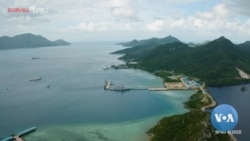Indonesia resumes gas exploration in the disputed South China Sea.
Welcome to VOA Asia Weekly. I'm Chris Casquejo in Washington. That story is just ahead, but first, making headlines.
One day after visiting the Ukrainian capital Kyiv, U.S. President Joe Biden delivered a speech from the Royal Castle in Warsaw, Poland, on Tuesday, marking the one-year anniversary of Russia’s invasion by highlighting how the United States has unified NATO and the West in support of Ukraine.
Russia and China showcased their deepening ties Wednesday in a series of meetings. Speaking at the start of talks with top Chinese diplomat Wang Yi, Russian President Vladimir Putin hailed ties between the two countries and added that the Kremlin expects Chinese President Xi Jinping to visit Russia.
North Korea fired two short-range ballistic missiles Monday morning in what it quickly made clear was retaliation for the United States’ joint aerial drills with South Korea. North Korean state media said a multiple rocket launching drill from the western front had sent two 600-millimeter rockets at targets 395 kilometers and 337 kilometers to the east.
The United States, South Korea, and Japan on Wednesday held a trilateral missile defense exercise in the international waters off South Korea's east coast. Three Aegis-equipped destroyers from the US Navy, South Korean Navy, and Japan Maritime Self-Defense Force took part in the drills held in the East Sea, which is known in Japan as the Sea of Japan.
Taiwan’s president Tsai Ing-wen said Tuesday the self-ruled island will deepen its military ties with the United States. U.S. Representative Ro Khanna, part of the bipartisan group of lawmakers visiting Taiwan, told President Tsai the delegation is in Taiwan to “affirm the shared values between the U.S. and Taiwan — a commitment to democracy, a commitment to freedom.”
The countries of Southeast Asia have long maintained a fragile balance between resisting China’s expansive claims in the South China Sea and maintaining good trade ties. But several, including Indonesia, are now standing firm in resisting those claims, as VOA’s Ahadian Utama reports from Jakarta.
Indonesia has approved an initial plan for the development of the Tuna Block gas field located in waters off its Natuna Islands.
It’s the same area where drilling in late 2021 led to a protest from China. Jakarta halted exploration then, but it isn’t backing down now.
"The gas drilling in the Natuna area by Indonesia is a clear sign that Natuna is Indonesian territory.”
The Natuna Islands themselves, off the coast of Indonesia’s Borneo, are Indonesian territory. But the waters about 200 miles away, where the Tuna Block is situated in the North Natuna Sea, is a source of contention.
Indonesia considers it also part of its exclusive economic zone, based on the U.N. Convention on the Law of the Sea, or UNCLOS.
But China includes it in its expansive territorial claims in the South China Sea, claims largely rejected by the Permanent Court of Arbitration at the Hague in 2016.
“Regarding Indonesia's activities in its national sea area, it’s based on the international maritime law, and Indonesia's position is that we do not have a dispute with any country that claims the South China Sea territory.”
The resumption of gas exploration could be seen as an escalation of tensions between Southeast Asia’s largest nation and China.
In December, tensions were already high when Indonesia and Vietnam finalized the boundaries of their exclusive economic zones, prompting Beijing to send its coast guard near the Tuna Block and Vietnam’s nearby Chim Sao gas field.
That move led Indonesia to send a warship to the North Natuna Sea.
"If they catch fish or carry out exploration or exploitation of marine resources, that is prohibited. It must be licensed by the Indonesian government. If they are just passing by, that's allowed."
The Indonesian Navy has now deployed five warships and a naval patrol plane to monitor the North Natuna Sea, which like many waters in the Indo Pacific, has also seen fishing activity from Chinese vessels, accompanied by the country’s coast guard.
From Jakarta, Indonesia, Ahadian Utama, VOA News.
Finally, a Japan-born giant panda set off for China on Tuesday from the Tokyo zoo where she was raised.
About 60,000 people applied for 2,600 spots to see 6-year-old Xiang Xiang on Sunday on her last viewing day.
Giant pandas are loaned to zoos around the world but China maintains ownership of them and their offspring.
Visit voanews.com for the most up-to-date stories. That’s all the time we have here on VOA Asia Weekly.
Thank you so much for joining us. I’m Chris Casquejo. Please be sure to tune in again next week.











